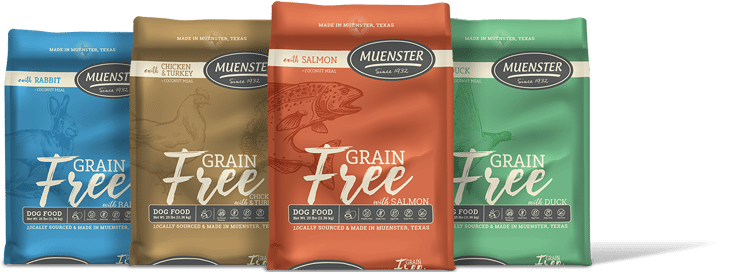
· By Mitch Felderhoff
Grain Free and Taurine
For the past decade, one of the fastest growing trends in the pet food industry has been the “grain-free” diet. These diets do not include corn, soy, and wheat, which are often seen as the “bad guys” by some pet parents. However, recently some dogs fed “grain-free” diets containing mainly potatoes, peas, lentils, and other legume seeds as the main ingredients have been implicated in the development of a heart disease called dilated cardiomyopathy (DC). Dogs diagnosed with DC have a weaker heart that cannot pump the blood properly. It’s well known by nutritionists that the heart needs taurine, an amino acid, to function properly. Interestingly, some dogs that were being fed “grain-free” diets and diagnosed with DC had lower levels of taurine in their bloodstream. But, is there a correlation between taurine and “grain-free” diets?
First, it is important to point out that tubers and legumes used in pet foods have been a part of our dietary choice for more than two decades. Second, it is important to note that grains are actually not “bad guys” for all dogs. Grains are a primary source of carbohydrate, and they also provide essential fatty acids, amino acids, and vitamins to the diet (Laflamme et., 2014).
The “grain-free” claim in pet food labels is merely offering the pet owner an ingredient choice. Some dogs simply can’t handle grains in the diet without setting off skin irritations or other auto-immune diseases that can be triggered by having too many inflammatory foods in their diet.
Despite the perception, there is really no scientific evidence associating grains with disease and allergy. Nor that legumes and tubers are bad for pets. Rather, some grains are a great source of an essential amino acid, methionine, which is needed in the diet for a host of metabolic functions, like conversion to taurine.
So, dogs that eat a diet high in methionine are able to produce enough natural methionine to synthesize taurine. (Some Grain Free diets that lack methionine may not be able to synthetize enough taurine, which might affect their heart function. There is some speculation that some “grain-free” diets may not be providing enough methionine to the dog because legume seeds are generally low in this nutrient. If we don’t formulate properly to compensate with this amino acid, dogs that have a genetic predisposition might develop DC.
On top of that, some “grain-free” diets use exotic or overly processed proteins, which might contribute even more to this issue. While there is plenty of information on the quality of traditional protein sources such as chicken & fish (the two proteins with the most methionine), there is almost none information available on those novel protein sources.
For example, chicken meal is a good source of methionine, but lamb meal is not (Torres et al., 2003). I wouldn’t get overly concerned if you see a small amount of peas in a grain-free diet, but I would think twice before buying a food that has 5 or 6 disguised under different names (peas, pea protein, legumes, chickpeas, field peas, yellow peas, and green peas). At this point, when you combine all of them together, they become the #1 ingredient pretty quick.
Are all “grain-free” diets bad for your dog? No. We cannot turn the “grain-free” diets into the new “bad guys” based on a few cases that haven’t been completely diagnosed. Nutritional balance is the key. Extremes in nutrition and ingredient choices usually bring some issues to the forefront.
The benefits of a balanced diet with a variety that your Doctor has been encouraging for you also applies to your dog. Each ingredient is different and brings to the plate an important mix of nutrients. When you combine many, you have a better chance at getting all that is needed. Some “grain-free” diets may be in the extreme, missing some variety for your dog that doesn’t provide all the nutrients needed.
Selecting your dog’s food from a reliable company that believes in balance rather than mere marketing, and choosing foods that bring nutrients from a wide cross-section of ingredients are good ways to ensure you are providing your furry friends a food they deserve.
If you remain concerned about the levels of methionine and taurine in pet food diets, I would encourage you to consider an “Ancient Grain” dog food. These grains will have strong levels of Methionine without the new GMO grains that many consumers would prefer to avoid.
Rest assured everyone at Muenster is aware of the concern, and we are studying our diets to see if we need to make any changes. We feel very comfortable already having an ancient grains line, and knowing we have plenty of high-quality proteins like chicken & fish carrying the weight in our grain-free diets with respect to methionine. If you have any further questions, please feel free to reach out.
Mitch Felderhoff
4th Generation Owner
Muenster Milling Co.
